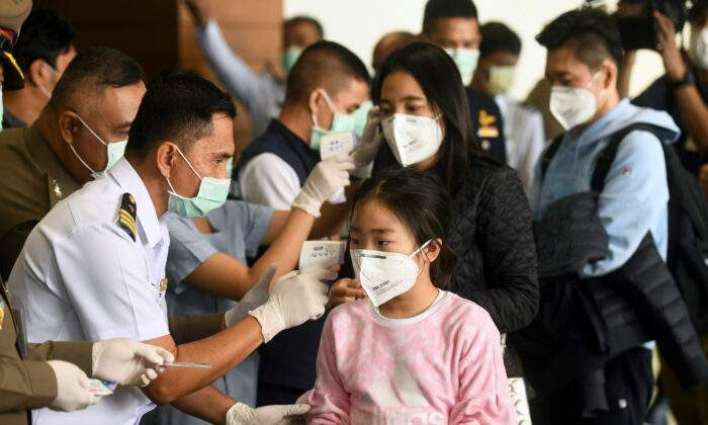The figures for the novel coronavirus (2019-nCoV) have increased tenfold from some 400 confirmed cases last Wednesday to over 4,000 this Tuesday, but the World Health Organization (WHO) has not yet designated the virus outbreak as a global health emergency
MOSCOW (Pakistan Point News / Sputnik - 28th January, 2020) The figures for the novel coronavirus (2019-nCoV) have increased tenfold from some 400 confirmed cases last Wednesday to over 4,000 this Tuesday, but the World Health Organization (WHO) has not yet designated the virus outbreak as a global health emergency.
The previously unknown type of the virus was first detected in the central Chinese city of Wuhan in late December, but later spread to other major cities such as Beijing, Shanghai, Macao, and Hong Kong. As of Tuesday, a total of 4,515 infection cases and 106 deaths have been confirmed in China, according to the country's National Health Commission. Chinese health officials expect the spread of virus to peak in 7-10 days, but say there would not be significant rate growth, despite some media outlets speculating that the figures may skyrocket up to 100,000 cases.
More cases have been registered beyond China. As of January 28, 14 cases have been confirmed in Thailand, seven in Singapore and Taiwan, six in Japan, five in the United States and Australia, four in Malaysia and South Korea, three in France, two in Vietnam, while Cambodia, Canada, Germany, Nepal, and Sri Lanka have registered one case each so far. A number of countries have also reported suspected cases of the virus contraction yet to be confirmed by local health officials.
The World Health Organization changed the global risk degree of the deadly coronavirus from "moderate" to "high," but chose not to declare a global health emergency.
RACE TO CREATE NEW CORONAVIRUS VACCINE
Efforts are taken globally to quickly develop a vaccine for the new coronavirus. The Coalition for Epidemic Preparedness Innovations (CEPI), in particular, announced on Thursday that it would support the relevant research of US-based Moderna and Inovio biotech companies and the University of Queensland. According the organization, the vaccine for the deadly virus may be developed by this summer.
The Bill & Melinda Gates Foundation announced on Sunday that it would donate $10 million to respond to the virus outbreak in China and Africa.
Two Russian universities are also currently working on the development of a vaccine for the new strain, according to the Russian consumer rights watchdog Rospotrebnadzor.
The epicenter of the outbreak, Wuhan, has been under virtual lockdown since Thursday. Authorities have suspended all transportation in and out of the city and advised its citizens to stay indoors if possible. Over a dozen of nearby cities in the Hubei province followed the suit.
Local authorities are currently building a new hospital in the city to accommodate patients affected by the virus.
Even though the WHO head said on Tuesday that there was no immediate need for evacuation of foreign citizens from Wuhan, expressing confidence in China's measures to contain the virus, France, Germany, India, Japan, Russia, South Korea and the United States are working on extracting their citizens from the epidemic-hit city this week.
PRECAUTIONARY MEASURES IN CHINA AND BEYOND
The deadly virus made the headlines around the time of the Chinese Lunar New Year celebrations, which usually sees large numbers of foreign tourists traveling to China, as well as Chinese citizens traveling abroad, mostly to neighboring countries such as Thailand, Vietnam and Japan.
Concerns over the spread of coronavirus inevitably hampered the tourist industry: the China Travel Service Association (CTSA) suspended group tours and travel packages within and outside China, while European travels firms are canceling any tours to China until late February. Nations across the world issued fresh travel advisories warning their citizens against traveling to China.
Some hotels in China have waived fees for the change or cancellation of bookings amid the virus outbreak, joined by many airlines, including Air China, AirAsia, American Airlines, British Airways, Cathay Pacific, Emirates, Delta, Virgin Atlantic and many others, that have either only offered full refunds or completely halted their flights to and from China.
Singapore has restricted entry and transit of people, whose passport issued in the Hubei province or who traveled to the virus epicenter recently. Local authorities have also ordered legally-binding quarantine for those considered to be likely infected, with those violating it facing severe punishment up to jail time.
Australia, which has registered five confirmed cases so far, asked families who had recently traveled to China not to take their children to kindergartens and schools for two weeks.
Precautionary measures have also been taken in Moscow, which is also a popular winter destination of Chinese tourists. According to the city mayor, hotels and tourist locations have been put under special surveillance.
The virus outbreak also saw the cancellation and postponement of a number of sporting events in China initially scheduled for February, including the Olympic qualifying events in boxing and women's football in Wuhan, the countdown to the start of the 2022 Beijing Games, the Asian Indoor Athletics Championship in Hangzhou, Hong Kong Marathon and many others.




